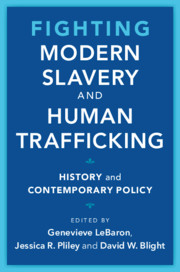Book contents
- Fighting Modern Slavery and Human Trafficking
- Slaveries since Emancipation
- Fighting Modern Slavery and Human Trafficking
- Copyright page
- Contents
- Figures
- Tables
- Contributors
- Preface
- Acknowledgments
- Abbreviations
- 1 Introduction
- 2 Counting Modern Slaves
- 3 Working Analogies
- 4 Free Soil, Free Produce, Free Communities
- 5 Ambivalent Abolitionist Legacies
- 6 Mexico’s New Slavery
- 7 Undermining Labor Power
- 8 A Market in Deception? Ethically Certifying Exploitative Supply Chains
- 9 Preventing Human Trafficking
- 10 Integrated and Indivisible
- Afterword If There Is No Struggle, There Is No Progress
- Index
2 - Counting Modern Slaves
Historicizing the Emancipatory Work of Numbers
Published online by Cambridge University Press: 18 June 2021
- Fighting Modern Slavery and Human Trafficking
- Slaveries since Emancipation
- Fighting Modern Slavery and Human Trafficking
- Copyright page
- Contents
- Figures
- Tables
- Contributors
- Preface
- Acknowledgments
- Abbreviations
- 1 Introduction
- 2 Counting Modern Slaves
- 3 Working Analogies
- 4 Free Soil, Free Produce, Free Communities
- 5 Ambivalent Abolitionist Legacies
- 6 Mexico’s New Slavery
- 7 Undermining Labor Power
- 8 A Market in Deception? Ethically Certifying Exploitative Supply Chains
- 9 Preventing Human Trafficking
- 10 Integrated and Indivisible
- Afterword If There Is No Struggle, There Is No Progress
- Index
Summary
Historians, like contemporary activists, use numbers to make moral claims: the greater the number of victims, the greater the moral value of a given phenomenon. But rarely do historians or contemporary activists reflect on how they use numbers or historicize the complex ways numbers have clarified or conversely obscured ethical claims about stopping slavery. In “Counting Modern Slaves,” I examine the particular political work that counting slaves has historically accomplished. I begin with the first British actors to make counting slaves profitable, the metropolitan architects of the planet’s first global marketplace, one in raced slaves. I then consider how abolitionists on both sides of the Atlantic flipped that calculating script by brilliantly deploying metrics to hammer home key arguments about the universal values in slavery’s demise. Contemporary abolitionists, in turn, have eschewed the racism of the quantifying architects of the slave trade, but use numbers to aggregate modern slaves without clarifying the ethical choices that shape their calculations. In “Counting Modern Slaves,” I do not condemn using numbers, but rather seek to clarify how, when, and why counting slaves has accomplished its emancipatory possibility.
Keywords
- Type
- Chapter
- Information
- Fighting Modern Slavery and Human TraffickingHistory and Contemporary Policy, pp. 34 - 55Publisher: Cambridge University PressPrint publication year: 2021
- 1
- Cited by



